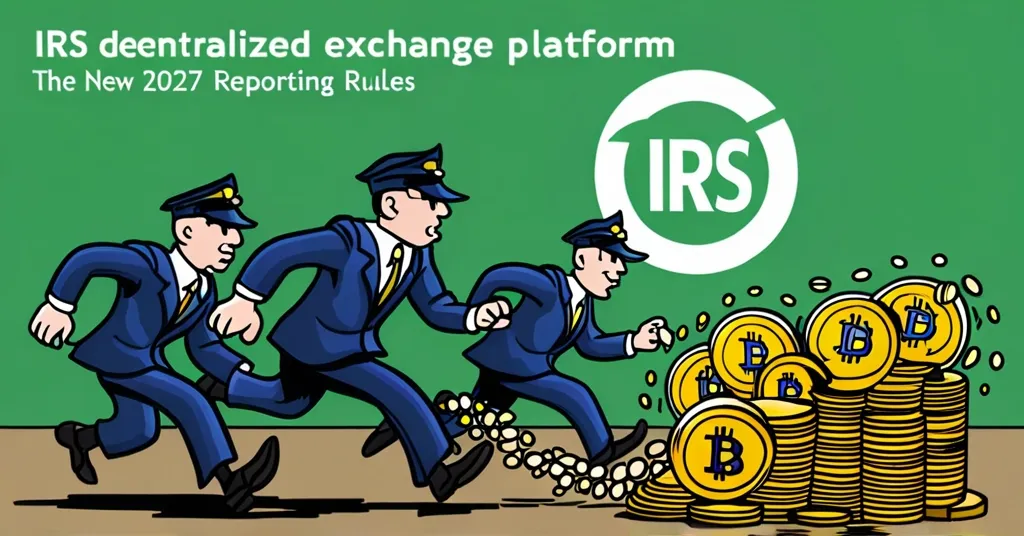IRS Targets DeFi: New 2027 Reporting Rules Impact 2.6M Taxpayers

IRS Shakes Up DeFi: New Reporting Rules Set for 2027
The Internal Revenue Service (IRS) is set to implement new regulations in 2027 that will require decentralized finance (DeFi) front-end platforms to report cryptocurrency sales and transactions. This move aims to align DeFi with traditional financial systems by extending broker reporting obligations to these platforms.
- IRS targets DeFi front-end platforms
- Brokers must report cryptocurrency sales starting 2027
- Up to 2.6 million taxpayers and 875 DeFi brokers affected
- IRS extends traditional broker standards to DeFi
What Are the New Regulations?
The IRS’s new rules mandate that front-end DeFi platforms, which are the user interfaces or trading services where individuals interact with DeFi services, report cryptocurrency sales and transactions. This category includes decentralized exchanges, where users trade cryptocurrencies without a central authority. The aim is to increase transparency and tax compliance within the DeFi sector.
The IRS views these platforms as brokers, subjecting them to the same reporting requirements as traditional financial intermediaries. Broker standards refer to rules that financial intermediaries must follow to report transactions to the government, ensuring that taxpayers pay the correct taxes. This move is part of a broader effort to bring the same level of accountability to DeFi as seen in traditional finance.
Who Is Affected?
The regulations are expected to impact between 650 and 875 DeFi brokers and up to 2.6 million taxpayers. DeFi platforms will need to start collecting data in 2026, with full enforcement coming into effect in 2027. Users interacting with these platforms will receive tax forms detailing the proceeds from their digital asset sales, though they will still need to track their cost basis independently.
Different types of DeFi users, from traders to liquidity providers and developers, will feel the impact. Traders will need to provide Know Your Customer (KYC) information, which could raise privacy concerns given DeFi’s traditionally decentralized and often anonymous nature. Liquidity providers might see changes in how their rewards are reported, while developers may need to adjust how their platforms operate to comply with the new rules.
Implications for DeFi
The IRS’s move to impose these reporting obligations on DeFi platforms marks a significant shift towards bringing more transparency and accountability to the sector. The agency states, “The only DeFi participants that are treated as brokers […] are trading front-end service providers.” This focus on the user interface layer underscores the IRS’s intent to target the part of the DeFi ecosystem that directly engages with users.
However, the regulations are not without controversy. The Treasury Department and the IRS assert, “The Treasury Department and the IRS do not agree that these final regulations reflect a bias against the DeFi industry or that these regulations will discourage the adoption of this technology by law-abiding customers.” Yet, the move to apply traditional broker standards to DeFi raises questions about privacy and the essence of decentralization.
The DeFi community faces a crucial decision: comply with these new regulations, challenge them legally, or consider moving operations offshore. Each option carries its own set of challenges and implications for the future of DeFi in the U.S. Will DeFi platforms find innovative ways to comply while preserving their decentralized ethos? Or will this be the beginning of a more centralized future for digital assets?
Compliance Strategies
DeFi platforms have several compliance strategies at their disposal. They might employ privacy-preserving technologies to balance reporting requirements with user privacy. Alternatively, some platforms might consider relocating their operations outside the U.S. to avoid the regulations altogether. Each approach carries its own set of challenges and potential benefits.
For example, using privacy-preserving technologies could allow platforms to comply with the IRS without compromising user anonymity—a delicate balance in the world of DeFi. Relocating operations offshore, while potentially avoiding regulations, could limit the platform’s accessibility to U.S. users and raise logistical and legal challenges.
Counterpoints and Benefits
While the new regulations present challenges, they also offer potential benefits. Increased transparency could lead to higher levels of investor protection and market stability. The IRS notes, “Information reporting by DeFi brokers under section 6045 will lead to higher levels of taxpayer compliance because the income earned by taxpayers engaging digital assets transactions without a custodial broker will be made more transparent to both the IRS and taxpayers.”
This transparency might also foster trust in DeFi platforms, attracting more mainstream users who are accustomed to traditional financial systems. However, the challenge remains to achieve this without undermining the core principles of decentralization and privacy that define DeFi.
International Context
These new rules are part of a broader trend of increasing regulatory scrutiny on the cryptocurrency sector globally. In contrast, the European Union’s Markets in Crypto-Assets Regulation (MiCA) focuses on regulating stablecoins and issuers of crypto assets, while the Crypto Assets Reporting Framework (CARF) aims to standardize the reporting of crypto transactions across jurisdictions.
The IRS’s approach, focusing on the front-end layer of DeFi, differs from these international frameworks but aligns with the global push towards greater transparency and accountability in the digital asset space. Understanding these different approaches can provide valuable context for the future of DeFi regulation worldwide.
Key Questions and Takeaways
- What are the new IRS regulations about?
The new IRS regulations mandate that DeFi front-end platforms report cryptocurrency sales and transactions starting in 2027.
- Which DeFi platforms are affected by these rules?
Specifically, front-end service providers, including decentralized exchanges, are targeted by these regulations.
- When will these regulations be enforced?
The regulations will be enforced in 2027, with mandatory data collection and reporting starting in 2026.
- How many DeFi brokers and taxpayers are expected to be impacted?
Between 650 and 875 DeFi brokers and up to 2.6 million taxpayers are expected to be affected by these new requirements.
- What is the IRS’s stance on these regulations?
The IRS views these regulations as merely extending existing broker standards to the DeFi industry, without any bias against it.
- Why are these regulations being introduced?
The IRS aims to increase transparency and taxpayer compliance in digital asset transactions by requiring DeFi platforms to report sales and transaction details.
The IRS is turning up the heat on DeFi, and things are about to get hot in 2027. As the DeFi community navigates these new regulatory waters, the question remains: Can DeFi maintain its core principles of decentralization and privacy while adhering to these new rules? The answer will shape the future of the industry in significant ways.
What do you think? Share your thoughts on the new IRS regulations and their impact on DeFi. Join the discussion on “Let’s Talk, Bitcoin” to stay informed and engaged with the latest developments in the crypto world.



